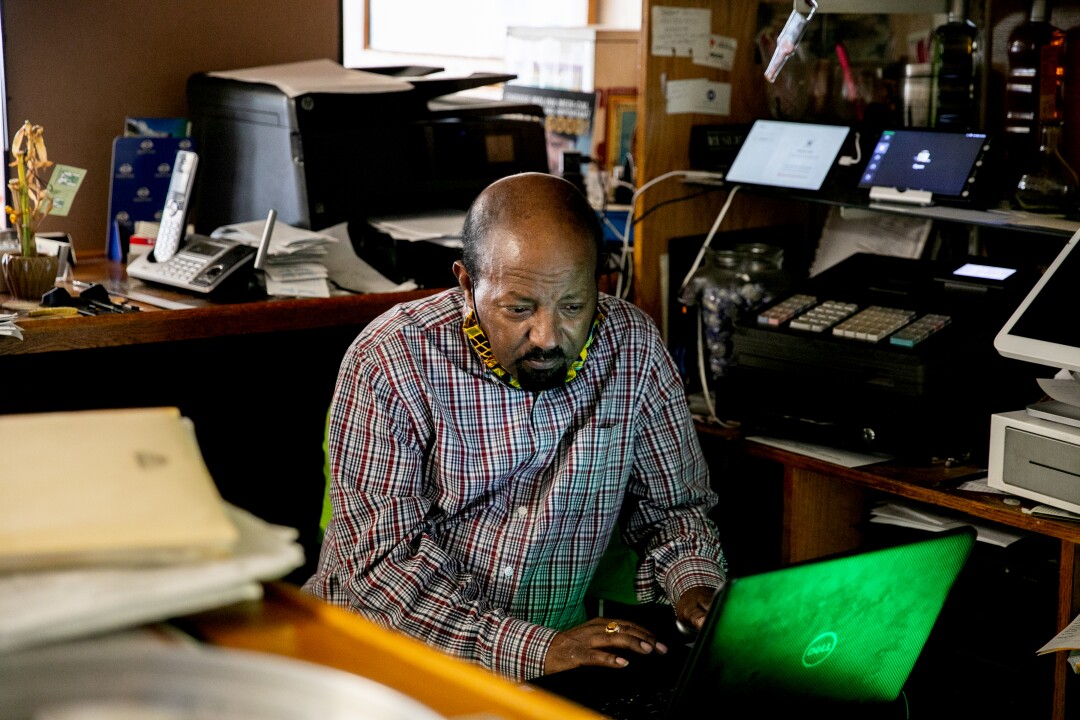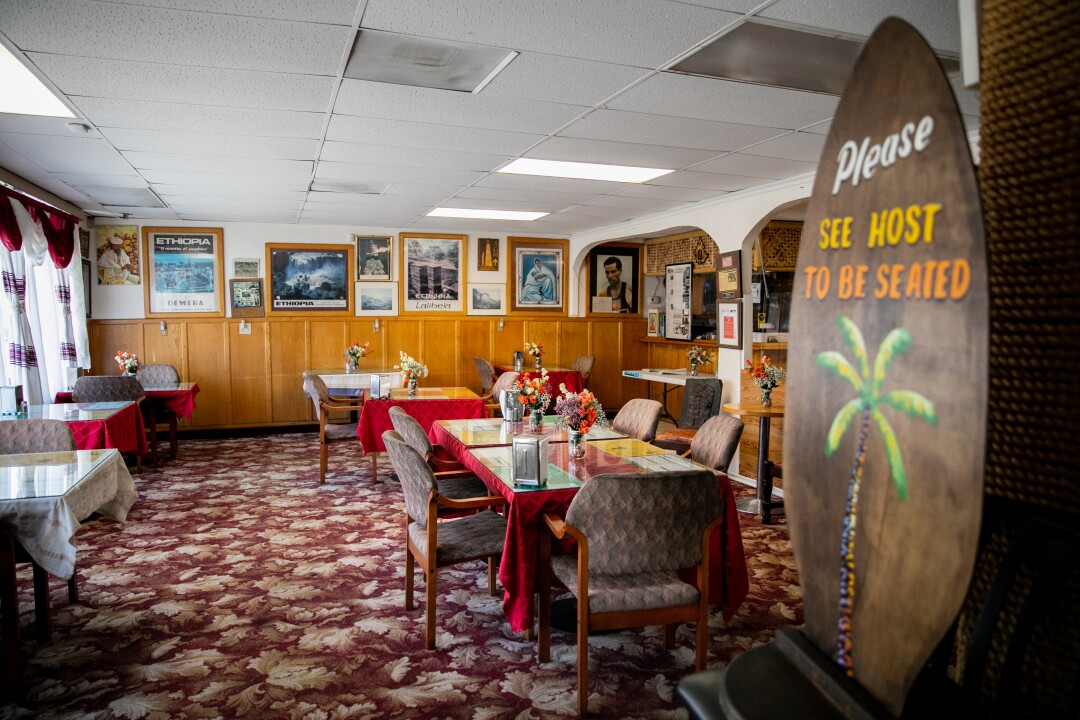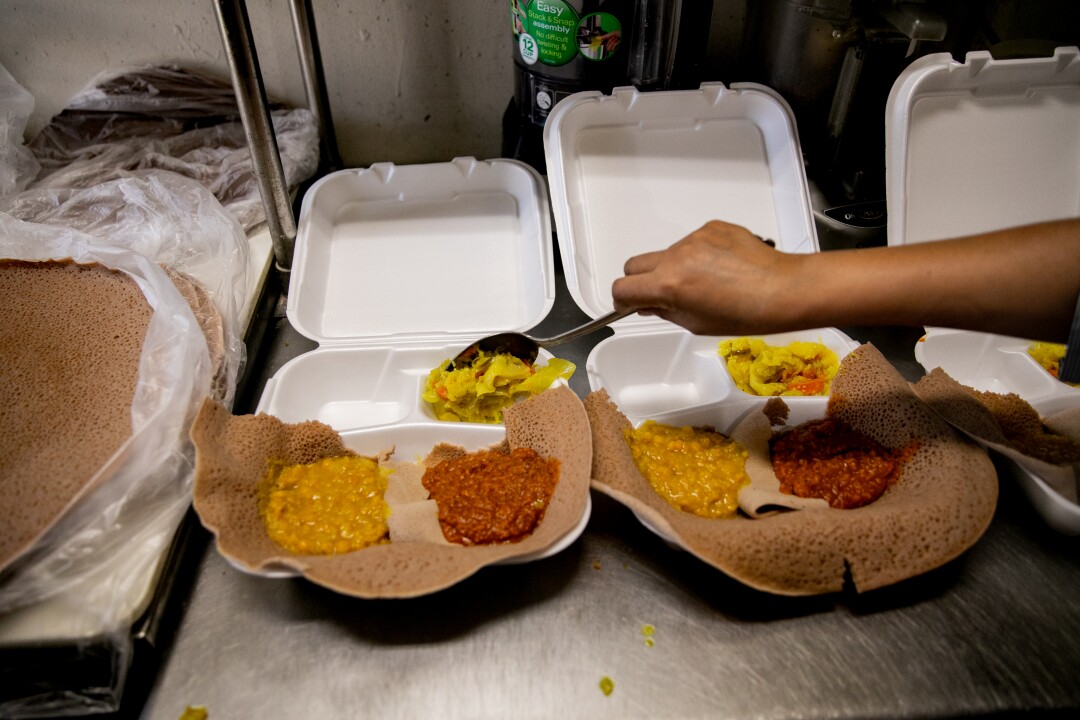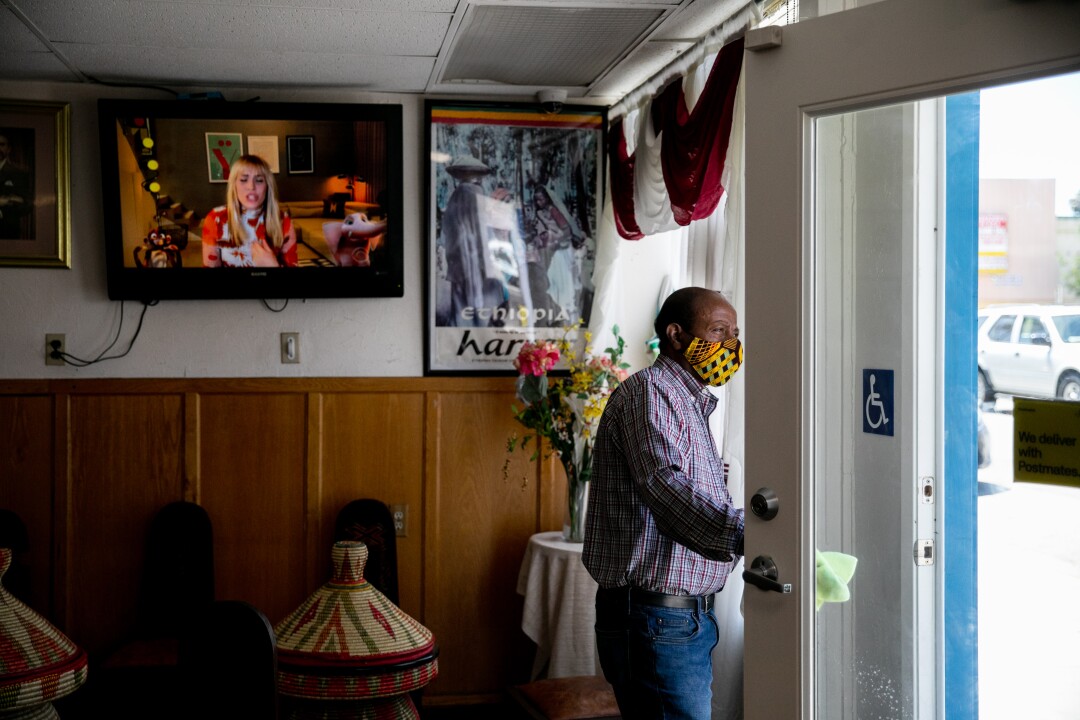Shimeles Kibret’s friendly eyes, framed by a colorful facemask, glinted with fatigue as he described how he and his wife, Yetanyet Abebe, have kept their heads above water.
Their Ethiopian restaurant, Red Sea, has bled money since the coronavirus pandemic triggered an economic lockdown — opening briefly for in-person dining several weeks ago, only to have to reverse course as cases spiked.
The couple scrambled to fill takeout orders to stay afloat, but many of their regular customers are low-wage workers — if they’re still working at all — with little disposable income.

Shimeles Kibret works behind the counter at Red Sea, the Ethiopian restaurant he owns and manages, on Monday, July 6, 2020 in San Diego, CA. Kibret is struggling to stay afloat as he works to comply with various governmental orders and other fallout from the coronavirus pandemic.
(Sam Hodgson / The San Diego Union-Tribune)
“Business is slow, very slow,” the 59-year-old refugee said solemnly.
His gaze wandered over to a set of traditional tables and chairs that he purchased from Ethiopia for roughly $9,000 right before the pandemic hit.
“I spent a lot of money on these,” he said, shaking his head. “Yeah, a lot of money.”
Shimeles said he’s had to tap personal savings to keep the restaurant going, as well as cover rent and other basic living expenses at the couple’s nearby home in the College neighborhood. He tried but couldn’t convince his landlord to temporarily lower their monthly payments.
Still, on this warm summer day there’s some good news. Shimeles had just received word that a $60,000 emergency loan would be hitting his bank account within days.
“It’s going to cover us for a while, probably another month, two months,” Shimeles, seated at a table in the restaurant’s empty dining room, said of the last-minute loan extended to him by the federal Small Business Administration. “Then we’ll see what’s going to happen.”

The dining room is largely empty at Red Sea, the Ethiopian restaurant Shimeles Kibret owns and manages, on Monday, July 6, 2020 in San Diego, CA. Kibret is struggling to stay afloat as he works to comply with various governmental orders and other fallout from the coronavirus pandemic.
(Sam Hodgson / The San Diego Union-Tribune)
It’s just one piece of the financial lifeboat the Ethiopian refugee is trying to piece together so that Red Sea can escape what some have projected will be a 33% fatality rate for restaurants nationwide.
Shimeles previously received a $7,000 grant through the City Heights Business Relief Fund. He’s also hoping to get a similar cash infusion through to San Diego County’s recently announced Small Business Stimulus Grant program.
The couple never received their $1,200 federal stimulus checks. And after wading through paperwork for months, were recently told by their bank, Wells Fargo, they would have to reapply for the Payroll Protection Program.
So without any other staff, they’ve been working around the clock.
“I can’t pay another person,” Yetanyet said, taking a rare break from making food. “All day I’m tried. Three months, four months, only me in the kitchen.”
Red Sea has endured for nearly 40 years in the neighborhood around University and Euclid avenues — a diverse, low-income community struggling to outlast the pandemic and record unemployment.

Yetanyet Abebe serves up traditional Ethiopian dishes inside the kitchen at Red Sea.
(Sam Hodgson / The San Diego Union-Tribune)
The smallest businesses in the area, like Red Sea, often have very little financial cushion and cannot afford to hire experts to hunt down funds in an emergency.
“We need to target resources to these communities,” said Enrique Gandarilla, executive director of the City Heights Business Association. “We can’t just say, ‘Here’s $10 billion. Everybody fight it out.’ Because businesses in more well-to-do areas that have the expertise, the lawyers, the bookkeepers and accountants, they’re going to be able to take advantage of that a lot faster.
“Bottom line is the longer these business are shut, the higher the probability they’re never going to open again,” he added. “These are not big corporations that have millions of dollars in the bank to pull on.”
Shimeles grew up in Ethiopia’s capital, Addis Ababa. His father was a military official for Haile Selassie, the country’s emperor for 44 years until a Soviet-backed military coup in 1974. Shimeles said he fled the country at 18 years old.
“We were young and anti-communist,” he said. “We protest and everything like that, so the government don’t like us. As soon as they put us in jail, they going to kill you.”
Of the few things Shimeles brought with him was a knowledge of traditional cooking he picked up from his mother.
“My mom, she gives me a book how to cook,” he said. “She show me how to do, and she give me spices.”
After first escaping to Greece to stay with family friends, Shimeles eventually received asylum in the U.S. and moved to San Diego in 1984. He got a job working for an office furniture company as a shipping clerk, eventually becoming a purchasing agent.
He also got involved with a group of Ethiopian refugees that had jointly started Red Sea. He saved his money and, in 1996, bought the restaurant and became the sole owner.

Yetanyet serves food to Mulugeta Gebremariam at Red Sea, the Ethiopian restaurant she owns and manages with her husband Shimeles Kibret.
(Sam Hodgson / The San Diego Union-Tribune)
That’s when he flew back to Ethiopia to marry Yetanyet and bring her to the U.S.
Shimeles’ face lights up when he talks about the ingredients he imports from his home country and how he and his wife carefully prepare the sauces.
“It’s very healthy,” he said. “We make here all the spice. I make it together with my wife. We mix it here for two, three months. A lot of garlic. A lot of onions. A lot of ginger. No one knows our recipe.”
Over the years, Red Sea has remained a lively meeting spot for Ethiopians and other Africans living in San Diego, many of whom fled violence and war in their home countries.
That community support has helped keep the establishment going in recent months. Regulars placed takeout orders, some donated money, and others volunteered their time.
Just the other day, a customer coming by to pick up food left an envelope with a thank-you card and $1,000.
A long-time friend, Mark Yeeles, 65, helped Shimeles secure the SBA loan. Yeeles met Shimeles in the mid-90s while volunteering with Catholic Charities to work with newly settled refugees from South Sudan.
“He was serving food when I went in there one time,” Yeeles said of Shimeles. “His disposition was so amazing.”
Yeeles, who still visits his friend at Red Sea every Tuesday, said Shimeles has maintained that positive outlook despite being in “dire straits.”
“I’ve never seen anyone weather the storm with so much joy,” he said.
Right now, the restaurant needs about $25,000 worth of work, including required Americans with Disabilities Act upgrades. The air conditioning needs to be repaired, and a broken freezer has to be replaced. Even Shimeles’ Nissan SUV, which he uses for work, has sprung a water leak.
Shimeles and Yetanyet, who belong to St. Gabriel, an Ethiopian Orthodox church, have been praying every day that Red Sea will survive.
“I’ve been so hard working to stay in this business for a long time,” he said. “God give it to us.”

Shimeles Kibret peers out the window of Red Sea.
(Sam Hodgson / The San Diego Union-Tribune)
"diary" - Google News
August 01, 2020 at 08:02PM
https://ift.tt/30iDysp
Diary of a Recovery: A refugee entrepreneur is thrown a last-minute lifeline - The San Diego Union-Tribune
"diary" - Google News
https://ift.tt/2VTijey
https://ift.tt/2xwebYA
Bagikan Berita Ini














0 Response to "Diary of a Recovery: A refugee entrepreneur is thrown a last-minute lifeline - The San Diego Union-Tribune"
Post a Comment